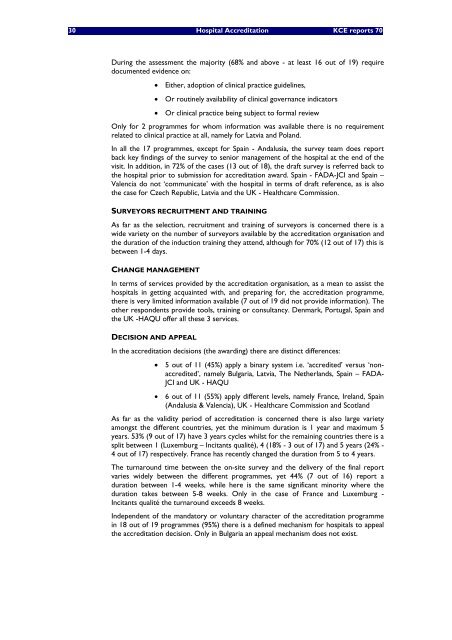Vergelijkende studie van ... - KCE
Vergelijkende studie van ... - KCE
Vergelijkende studie van ... - KCE
Create successful ePaper yourself
Turn your PDF publications into a flip-book with our unique Google optimized e-Paper software.
30 Hospital Accreditation <strong>KCE</strong> reports 70<br />
During the assessment the majority (68% and above - at least 16 out of 19) require<br />
documented evidence on:<br />
• Either, adoption of clinical practice guidelines,<br />
• Or routinely availability of clinical governance indicators<br />
• Or clinical practice being subject to formal review<br />
Only for 2 programmes for whom information was available there is no requirement<br />
related to clinical practice at all, namely for Latvia and Poland.<br />
In all the 17 programmes, except for Spain - Andalusia, the survey team does report<br />
back key findings of the survey to senior management of the hospital at the end of the<br />
visit. In addition, in 72% of the cases (13 out of 18), the draft survey is referred back to<br />
the hospital prior to submission for accreditation award. Spain - FADA-JCI and Spain –<br />
Valencia do not ‘communicate’ with the hospital in terms of draft reference, as is also<br />
the case for Czech Republic, Latvia and the UK - Healthcare Commission.<br />
SURVEYORS RECRUITMENT AND TRAINING<br />
As far as the selection, recruitment and training of surveyors is concerned there is a<br />
wide variety on the number of surveyors available by the accreditation organisation and<br />
the duration of the induction training they attend, although for 70% (12 out of 17) this is<br />
between 1-4 days.<br />
CHANGE MANAGEMENT<br />
In terms of services provided by the accreditation organisation, as a mean to assist the<br />
hospitals in getting acquainted with, and preparing for, the accreditation programme,<br />
there is very limited information available (7 out of 19 did not provide information). The<br />
other respondents provide tools, training or consultancy. Denmark, Portugal, Spain and<br />
the UK -HAQU offer all these 3 services.<br />
DECISION AND APPEAL<br />
In the accreditation decisions (the awarding) there are distinct differences:<br />
• 5 out of 11 (45%) apply a binary system i.e. ‘accredited’ versus ‘nonaccredited’,<br />
namely Bulgaria, Latvia, The Netherlands, Spain – FADA-<br />
JCI and UK - HAQU<br />
• 6 out of 11 (55%) apply different levels, namely France, Ireland, Spain<br />
(Andalusia & Valencia), UK - Healthcare Commission and Scotland<br />
As far as the validity period of accreditation is concerned there is also large variety<br />
amongst the different countries, yet the minimum duration is 1 year and maximum 5<br />
years. 53% (9 out of 17) have 3 years cycles whilst for the remaining countries there is a<br />
split between 1 (Luxemburg – Incitants qualité), 4 (18% - 3 out of 17) and 5 years (24% -<br />
4 out of 17) respectively. France has recently changed the duration from 5 to 4 years.<br />
The turnaround time between the on-site survey and the delivery of the final report<br />
varies widely between the different programmes, yet 44% (7 out of 16) report a<br />
duration between 1-4 weeks, while here is the same significant minority where the<br />
duration takes between 5-8 weeks. Only in the case of France and Luxemburg -<br />
Incitants qualité the turnaround exceeds 8 weeks.<br />
Independent of the mandatory or voluntary character of the accreditation programme<br />
in 18 out of 19 programmes (95%) there is a defined mechanism for hospitals to appeal<br />
the accreditation decision. Only in Bulgaria an appeal mechanism does not exist.

















